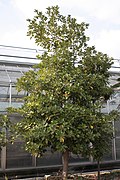Machilus thunbergii (syn. Persea thunbergii), the Japanese bay tree, red machilus, or tabunoki, is a widespread species of flowering plant in the family Lauraceae.[3] It is native to Vietnam, Taiwan, southeast and north-central China, the Korean Peninsula, and Japan.[2] A sturdy evergreen tree, usually 10–15 m (30–50 ft) tall, and reaching 20 m (70 ft), it is used for timber, and as a street tree.[4] Its bark is the source of makko, a powder used to make a mosquito‑repelling incense.[5] It prefers coastal areas, and can handle saline soil.[3]
| Machilus thunbergii | |
|---|---|

| |
| In Hiroshima Castle | |

| |
| Close up of leaves | |
| Scientific classification | |
| Kingdom: | Plantae |
| Clade: | Tracheophytes |
| Clade: | Angiosperms |
| Clade: | Magnoliids |
| Order: | Laurales |
| Family: | Lauraceae |
| Genus: | Machilus |
| Species: | M. thunbergii
|
| Binomial name | |
| Machilus thunbergii | |
| Synonyms[2] | |
|
List
| |
-
Makko powder, top left
-
Flowers
-
As a street tree in South Korea
-
Sapling at the Chengdu Botanical Garden
-
Hasaki no O-tabu
-
As an object of veneration, Japan
References
edit- ^ Liu, B.; Liu, H.; Botanic Gardens Conservation International (BGCI).; IUCN SSC Global Tree Specialist Group (2019). "Machilus thunbergii". IUCN Red List of Threatened Species. 2019: e.T147638804A147638806. doi:10.2305/IUCN.UK.2019-2.RLTS.T147638804A147638806.en. Retrieved 18 November 2021.
- ^ a b "Machilus thunbergii Siebold & Zucc". Plants of the World Online. Board of Trustees of the Royal Botanic Gardens, Kew. Retrieved 6 August 2021.
- ^ a b Takahashi, Hiroshi (10 August 2017). "Deepening Summer: Ancient Trees in the Season of Heat". nippon.com. Nippon Communications Foundation. Retrieved 6 August 2021.
- ^ Jo, Hyun-Kil; Kim, Jin-Young; Park, Hye-Mi (2019). "Carbon Reduction Services of Evergreen Broadleaved Landscape Trees for Ilex rotunda and Machilus thunbergii in Southern Korea". Journal of Forest and Environmental Science. 35 (4). doi:10.7747/JFES.2019.35.4.240.
- ^ Karikome, Hiroyuki; Mimaki, Yoshihiro; Sashida, Yutaka (1991). "A butanolide and phenolics from Machilus thunbergii". Phytochemistry. 30: 315–319. doi:10.1016/0031-9422(91)84145-I.






